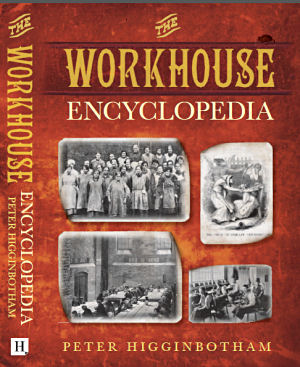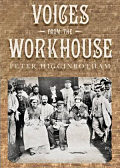Workhouse by Simon Fowler
Simon Fowler's book Workhouse, published by The National Archives in 2007, received mixed reviews ranging from "impressively well-researched" to "innaccurate and poorly composed". What was most distinctive for such a work, however, was its lack of any specific references to the sources of the material it presented. Readers were thus unable to decide whether Mr Fowler's research was indeed "impressive" or whether, perhaps, he might, for example, be playing fast and loose with the work of others.
In fact, the wording of some sections of Mr Fowler's volume bear a striking similarity to material on this website which, in all cases, predates the book's publication. Some illustrative examples are given below.
Fowler page 77:
William Bragger's letter of application to become the workhouse master was printed, along with two* others, in the Wrexham Advertiser in January 1857... First, Edgworth**, the chairman of the Guardians, read out all 22 letters of application and references to the assembled guardians. Then a shortlist of three candidates, Bragger, Roberts, and Davies, was evidently prepared. At this stage, individual guardians who had been impressed by a particular applicant rose to make a speech of approbation, Mr Challoner rose to propose Bragger as Master. He drew attention to his army credentials and his reference from Colonel Yorke, which was based on twenty years' acquaintance. Mr Dashwood Parry seconded the nomination, and this was enough to secure Bragger's selection.
www.workhouses.org.uk/Wrexham :
[The text below was contributed to my site by Dr Andrew Taylor and has not been published elsewhere. Dr Taylor was never contacted by Mr Fowler regarding use of his material.]
William's letter of application, along with two* others, was printed in the Wrexham Advertiser of Jan 1st 1857... First, Edgworth** read out all the 22 letters of application and references, to the 39 assembled Guardians, which took an hour and a half. Then, a shortlist was evidently prepared of three candidates, Bragger, Roberts, and Davies. At this stage, individual Guardians who had been impressed by an applicant rose to make a speech of approbation, Mr Challoner rising to propose Bragger as Master. He drew attention to Bragger's Army credentials and his reference from Colonel Yorke, which was based on twenty years' acquaintance. Mr Dashwood Parry seconded the nomination.
* In fact it was accompanied by three others - Dr Taylor miscounted.
** Edgworth is not named in the newspaper's account of the election proceedings.
Fowler pages 82-83:
And during 1862 the guardians were surprised that Bragger had not entered 'the nature and length' of punishments to inmates in his log book, only to be told that the former sergeant-major avoided inflicting punishments on the poor if he could help it, preferring to govern the house without such sanctions.
-----
At Wrexham, William Bragger was a generous and imaginative workhouse master, rarely using the punishment book and dressing the paupers in different clothes to give them a sense of individuality and lessen the stigma of being in the house.
-----
In his obituary, in the Wrexham Telegraph, in July 1863, it was noted that the master 'seldom' returned from the market without gifts in the form of tobacco and snuff for male inmates and toys and cakes for the children, and he was in the habit of paying the debts of certain inmates in dire financial straits.
www.workhouses.org.uk/Wrexham:
[The text below was contributed to my site by Dr Andrew Taylor and has not been published elsewhere.]
During 1862, the Guardians were surprised that Bragger had not entered 'the nature and length' of punishments to inmates in his log book, only to be told that the former Sergeant-Major avoided inflicting punishments on the poor if he could help it, preferring to govern the house without such sanctions. Furthermore, Bragger ensured that the inmates were dressed differently from each other, rather than in uniform, in order to give them a sense of individuality and to lessen the stigma of being in the house.
-----
In the obituary for Bragger in the Wrexham Telegraph of July 1863 it was noted that the master 'seldom' returned from the market without gifts in the form of tobacco and snuff for male inmates, and toys and cakes for the children, and he was in the habit of paying the debts of certain inmates in dire financial straits.
Fowler page 102, final paragraph:
Saturday was special pudding day with suet and currants 'as firm as a rock'. Monday was 'lobby' day, that is, 'mutton and potatoes, frequently sour'. The 'lobby' was retrieved from Thursday's weekly meat dinner, after Friday's pie had been made from it. Potatoes were the only vegetable used in the workhouse and all the food was steamed. The piggery stood next to the children's yard. The pigs were fed on what the inmates could not eat and were said to be in 'superb condition'.
www.workhouses.org.uk/Rochdale:
Saturday was special pudding day with suet and currants 'as firm as a rock'. Monday was "lobby" day: "mutton and potatoes, frequently sour". The "lobby" was retrieved from Thursday's weekly meat dinner, after Friday's pie had been made from it. Potatoes were the only vegetable used in the workhouse and all the food was steamed. The piggery stood next to the children's yard. The pigs were fed on what the inmates could not eat and were in 'superb condition'.
Fowler page 154, paragraph 2:
Between 1863 and 1865 a new union workhouse was erected at Marland, Rochdale. It was designed to accommodate 260 adults and 40 children. In 1870 it housed 194 paupers, none able-bodied, of whom 47 were imbeciles, mostly bedridden. Even by the low standards of most workhouses, Marland was badly run. Diets ordered by the medical officer were rarely provided. Infectious cases wandered at will through the wards. There were few means of washing clothes, utensils or bodies. Medicines were administered by paupers and kept in unlabelled bottles in a box, together with blacking and firewood. Although pauper nurses were supposed to be able to read, the guardians claimed that the medical officer never wrote prescriptions because the only medicine in the unlabeled bottles was cod-liver oil, as the illiterate nurses well knew. All inmates urinated into a tub in the corner of each ward — the urine was sold by the guardians for scouring cotton. The inmates had head sores and the itch and had all been dosed with sulphur, brimstone and cod-liver oil for eight months but the scratching had not stopped. Diarrhoea was endemic.
www.workhouses.org.uk/Rochdale:
In 1863-5, a new workhouse was erected at Marland... The new workhouse accommodated 260 adults and 40 children. In 1870 there were 194 paupers, none able-bodied, of which 47 were imbeciles, mostly bedridden.
The new Marland workhouse appears to have been poorly run... diets ordered by the medical officer were rarely provided. Infectious cases wandered at will through the wards. There were few means of washing clothes, utensils or bodies... Medicines were administered by paupers who could not read and kept in unlabeled bottles, together with blacking and firewood, in a box. Although pauper nurses had to be able to read, the Guardians claimed that the medical officer never wrote prescriptions because the only medicine in the unlabeled bottles was cod-liver oil, as the illiterate nurses well knew. All inmates urinated into a tub in the corner of each ward — the urine was sold by the guardians for scouring cotton. The inmates had head sores and the itch and had all been dosed with sulphur, brimstone and cod-liver oil for eight months but the scratching had not stopped. Diarrhoea was endemic.
Note: Mr Fowler has now (September 2014) produced a revised edition of his book with a different publisher. As before, however, there are no references within the text to the sources of any of his material. The original edition of his book described this website as a "superb resource". Interestingly, that phrase has been dropped from the new edition.





